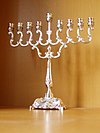Mattathias
| Mattathias | |
|---|---|
 An imaginary depiction of Mattathias from Guillaume Rouillé's Promptuarii Iconum Insigniorum (1553) | |
| Leader of the Maccabees | |
| Successor | Judas Maccabeus |
| Died | 166–165 BCE |
| Burial | |
| Issue | Judas Maccabeus Eleazar Avaran Simon Thassi John Gaddi Jonathan Apphus |
| Dynasty | Hasmonean |
| Religion | Judaism |
Mattathias ben Johanan (Hebrew: מַתִּתְיָהוּ הַכֹּהֵן בֶּן יוֹחָנָן, Mattīṯyāhū haKōhēn ben Yōḥānān; died 166–165 BCE)[1] was a Kohen (Jewish priest) who helped spark the Maccabean Revolt against the Hellenistic Seleucid Empire. Mattathias's story is related in the deuterocanonical book of 1 Maccabees and in the writings of Josephus. Mattathias is accorded a central role in the story of Hanukkah and, as a result, is named in the Al HaNissim prayer Jews add to the Birkat Hamazon (grace after meals) and the Amidah during the festival's eight days.
History[edit]

In all extant accounts from the Second Temple Period, Mattathias was a resident of the rural village of Modi'in, though it is not clear if he was a native.[2] The account of 1 Maccabees states that he moved away from Jerusalem and settled in Modi'in,[3] and while the account of Josephus in Antiquities[4] matches this, the account in Wars simply states that Mattathias (or his father) was a "priest of a village called Modi'in",[5] implying that it was his place of origin.[2]
The account of 1 Maccabees provides the lineage of Mattathias, stating that he was a son of John (Johanan) and grandson of Simeon, a priest from the order of Joarib.[3] Josephus adds the name of Asamonaius to this lineage in both his accounts, and though later rabbinic sources mention Hasmonai as a specific person,[6] "Asmonaius" or "Hasmonean" was probably meant as a family title[2]. This would lead to Mattathis and his descendants being known as the Hasmoneans. Further back, he was the great-grandson of Asmon or Hasmonaeus, a Kohen of the lineage of Joarib known for being the fifth grandson of Idaiah, son of Joarib and grandson of Jachin, in turn a descendant of Phinehas, third High Priest of Israel.[7][8] Like many priests, he most probably served in the Second Temple in Jerusalem, though the sources stating that he was a High Priest[6][9] are relatively late and anachronistic.[2]
Mattathias was the father of Judas Maccabeus (Judah Maccabee), Eleazar Avaran, Simon Thassi (Simeon), John Gaddi, and Jonathan Apphus (Yonatan).
First Stage of the Rebellion[edit]
The accounts of 1 Maccabees and Josephus largely agree in their description of the oppressive laws the Hellenistic administration enforced on the Jewish people, and the role Mattathias played in opposing them.[2]
In 168–167 BCE, a series of Seleucid persecutions of traditional Judaism began, spearheaded by King Antiochus IV Epiphanes and possibly High Priest Menelaus as well.
In 167 BCE, a company of Greek soldiers appeared in Modi'in with orders to enforce Antiochus' ordinances of sacrificing to the Greek gods. Mattathias, being an esteemed member of the community, was asked to represent the villiage in the sacrifice; he refused, and another Jew stepped forward to do so. Mattathias then slew both the government official overseeing the sacrifice and the Jewish volunteer,[2] Thus the rebellion began.
Let everyone who is zealous for the law and supports the covenant come out with me!
— Mattathias, after assassinating the Greek government official, who was forcing him to sacrifice; 1 Maccabees 2:27
Upon the dramatic killing of the official and the Jew, he and his five sons fled to the wilderness of Judea where they began to build a guerilla force of followers. The area was then known as the Gophna Hills, a region near modern Jifna. Mattathias then disappears from historical record. According to 1 Maccabees, he died in the 146th year of the Ancient Macedonian calendar, equivalent to some point between Spring 166 – Spring 165 BCE.[10][11]
Context[edit]

This was the first step in the Maccabean Revolt, the result of which was Jewish independence, which had not been enjoyed for more than 400 years. The events of the war of the Maccabees form the basis for the holiday of Hanukkah, which is celebrated by Jews on the 25th of Kislev (on the Hebrew calendar, corresponding to mid-November to late December in the Gregorian calendar).
In literature and liturgy[edit]
The story of the Maccabees can be found in the deuterocanonical book of 1 Maccabees, in Josephus, and in Talmudic references (Shabbat 21b, Shabbat 23a – related to the candles). He is also made reference to in chapter 28 of 1 Meqabyan, a book considered canonical in the Ethiopian Orthodox Tewahedo Church.[12][better source needed] The "Al HaNisim" prayer, added into the Amidah and Birkat Hamazon on Hanukkah, refers to the story of the Maccabees and to Mattathias by name.
See also[edit]
References[edit]
- ^ "Mahlon H. Smith". Virtualreligion.net. Retrieved 2014-02-07.
- ^ a b c d e f Gafni, Isaiah (2007). "Mattathias". In Skolnik, Fred (ed.). Encyclopaedia Judaica Lif-Mek. Vol. 13 (2nd ed.). Michigan: Thomson Gale. p. 685.
- ^ a b 1 Maccabees 2:1.
- ^ Josephus, Antiquities 12:265.
- ^ Josephus, The Jewish War 1:36.
- ^ a b Babylonian Talmud, Megilla 11a.
- ^ "Web.genealogie". Archived from the original on 2008-01-24. Retrieved 2008-11-12.
- ^ T. Stanford Mommaerts (2005-04-11). "Ancient Genealogy chart – Ansbertus".
- ^ Tractate Soferim 20:6
- ^ Bar-Kochva, Bezalel (1989). Judas Maccabaeus: The Jewish Struggle Against the Seleucids. Cambridge University Press. p. 472. ISBN 0521323525.
- ^ 1 Maccabees 2:69–2:70
- ^ "Torah of Yeshuah: Book of Meqabyan I–III". July 11, 2015.
Sources[edit]
- Weir, William (2004). 50 Battles That Changed the World: The Conflicts That Most Influenced the Course of History. Savage, Md: Barnes and Noble Books. ISBN 0-7607-6609-6.
External links[edit]
- Mattathias ben Johanan entry in historical sourcebook by Mahlon H. Smith

